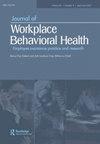Job-related stress and tobacco smoking: A systematic review
IF 0.8
Q3 PUBLIC, ENVIRONMENTAL & OCCUPATIONAL HEALTH
引用次数: 6
Abstract
Abstract Job-related stress may affect smoking initiation, progression, and intensity, therefore, it is important to have a better understanding of these associations to design targeted and effective workplace cessation programs. In this study, we aimed to synthesize existing literature concerning the relationship between job-related stress and tobacco use among adult workers (18 years and older). We searched articles indexed in six major databases (Scopus, PubMed, Embase, Web of Science, EBSCO, and Ovid) between 1997 and March 2020. We included cross-sectional and cohort studies published in English that examined self-reported smoking status or change in smoking status as exposure variables, and job-related status as the outcome variable consistent with the Demand Control Support and Effort-Reward Imbalance models. We searched the databases using combinations of keywords including “occupational stress,” or “job stress” or “work stress” or “job strain” and “smoking” or “tobacco use” or “tobacco consumption” or “cigarettes.” Of 906 identified articles, 19 (n = 240,787 participants) were included in this review. Findings showed no clear association between job-related stress and smoking status (smoking vs nonsmoking) and smoking cessation. However, the findings suggest an association between job-related stress and changing smoking habits, toward heavier smoking. Our findings indicate that job-related stress may lead to increased smoking intensity.工作压力与吸烟:一项系统综述
摘要与工作相关的压力可能会影响吸烟的开始、发展和强度,因此,更好地了解这些关联对于设计有针对性和有效的工作场所戒烟计划很重要。在这项研究中,我们旨在综合现有的关于成年工人中与工作相关的压力与吸烟之间关系的文献(18 岁及以上)。我们搜索了1997年至2020年3月期间在六个主要数据库(Scopus、PubMed、Embase、Web of Science、EBSCO和Ovid)中索引的文章。我们纳入了以英语发表的横断面和队列研究,这些研究将自我报告的吸烟状态或吸烟状态的变化作为暴露变量,将工作相关状态作为结果变量,与需求控制支持和努力-回报失衡模型相一致。我们使用关键词组合搜索数据库,包括“职业压力”、“工作压力”、《工作压力》、“工作紧张”、“吸烟”、“使用烟草”、“烟草消费”或“香烟” = 240787名参与者)。研究结果显示,与工作相关的压力与吸烟状况(吸烟与不吸烟)和戒烟之间没有明确的联系。然而,研究结果表明,与工作相关的压力与吸烟习惯的改变之间存在关联,吸烟量更大。我们的研究结果表明,与工作相关的压力可能会导致吸烟强度增加。
本文章由计算机程序翻译,如有差异,请以英文原文为准。
求助全文
约1分钟内获得全文
求助全文
来源期刊

Journal of Workplace Behavioral Health
PUBLIC, ENVIRONMENTAL & OCCUPATIONAL HEALTH-
CiteScore
2.40
自引率
6.70%
发文量
14
期刊介绍:
The Journal of Workplace Behavioral Health, retitled from Employee Assistance Quarterly to better reflect its expanded focus, presents innovative research, applied theory, and practical information to keep workplace human service administrators, counselors, and consultants up to date on the latest developments in the field. This refereed journal is an essential guide to best practice and research issues faced by EAP professionals who deal with work-related and personal issues including workplace and family wellness, employee benefits, and organizational development.
 求助内容:
求助内容: 应助结果提醒方式:
应助结果提醒方式:


